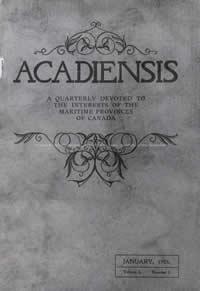Acadiensis

The original Acadiensis was a quarterly magazine launched in Saint John, New Brunswick on 1 January 1901. It was published continuously (mostly quarterly) until October 1908. Acadiensis was a general interest magazine with a primarily historical focus, but it also examined a range of literary, artistic, and cultural topics of the Maritime region.
Acadiensis was founded by David Russell Jack (1864–1913), a Maritime history enthusiast and Spanish Vice-Consul. It was intended to replace the New Brunswick Magazine, the New Brunswick Historical Society’s attempt at a Maritime history periodical (Buckner 4). Jack himself was the largest contributor to the magazine, writing numerous articles on regional history, genealogy, and even a running series cataloguing book-plates of various Acadians. Aside from Jack, William Francis Ganong was a frequent contributor, having promised to write an article for each issue (Jack 8, "Adieu," 236). Acadiensis’s other regular contributors were Jonas Howe, Clarence Ward, Reverend R.R. McLeod, Gilbert O. Bent, and Reverend W.O. Raymond, all of whom were prominent members of the New Brunswick Historical Society (Buckner 5).
Though the bulk of the articles were of an historical nature, Jack also included book reviews, biographical pieces, fiction, drawings, folklore, and notes on important Maritimers. In the first issue, he stated that the magazine’s intent was to promote the territory of Acadia (described as the Maritimes and regions of Quebec and Maine), particularly its “past history or future prospects,” and, by doing so, to encourage regional pride (Jack 1: 5). For this reason, he also sought “descriptive, scientific, or philosophical contributions … verse, as well as short stories, in which the principal scene is laid in Acadia, or which are the productions of Acadian writers” (5).
The creative works published in Acadiensis were mostly poems, two or three of which were published in most issues. The poets frequently featured included Charles Campbell, Herbert Brewster, I. Jack Allen, and Bliss Carman. Jack preferred poems that featured retellings of historical events and First Nations’ legends or that focused on nature and the land of Acadia. Bliss Carman’s “A Supplication” is an example of the type of poem Jack published:
O April, angel of our mortal joy,
Consoler of our human griefs and fears,
Bringer of sunshine to this old grey earth,
Hear, once again, the prayer of thy lone child,
Return, return!
Mother of solace in the soft spring rain,
Restorer of sane health to wounded souls,
Ah, tarry not thy coming to our doors,
But soon with twilight and the robin’s voice,
Return!
Behold, across the borders of the world,
We wait the reappearance with the flowers,
Disconsolate, dispirited, forlorn,
Our only childish and perpetual prayer,
“Return, return!” (2: 72)
In its later years, Acadiensis published a few short fictional sketches and fewer poems. The journal became shorter in length due to increasing publication costs. There was also less space allotted to literature due to the serialization of larger historical works, including the entirety of J.W. Lawrence’s The Judges of New Brunswick and their Times.
While Acadiensis was rarely political, Jack succumbed to the spread of Canadian nationalism in the early-twentieth-century, believing that “Canada should have a purely Canadian literature for the promotion of Canadian interests and the dissemination of Canadian thought” (7: 182). He voices this sentiment again in the final issue of Acadiensis, where he decries Canadian readers and publishers for supporting the “work of alien authors [over] that of the men and women of their own land” (7: 340).
Acadiensis was well received upon its launch, garnering a three-page review in the Review of Historical Publications Relating to Canada. The review praised Jack’s competence as an editor and expressed hope that the magazine would be “permanently established as a vehicle for the local history of south-eastern Canada” (Review 7: 73). Throughout its publication, it was considered to have “no rival among similar periodicals” (Review 12: 63), and today, the original Acadiensis is considered to be “one of the most important periodicals of its kind produced during the era” (Frank).
Despite these words of praise, Acadiensis was never a financial success. The response on a local level was disappointing, and the magazine was largely ignored in Fredericton (Jack 3: 71). After its fifth year, the journal began to experience financial difficulty, though it retained a high standard of quality (Lochhead 2). Eventually, Acadiensis’s publication costs exceeded its revenue: it began running an annual deficit of $200-$300, which Jack paid for personally (7: 236). The final issue of Acadiensis was published in October 1908.
Victoria Embree, Spring 2012
St. Thomas University
Bibliography of Primary Sources
Carman, Bliss. “A Supplication.” Acadiensis 2 (1902): 72.
Jack, David Russell. “Adieu.” Acadiensis 8 (1908): 235-7.
---. “Book Reviews.” Acadiensis 7 (1907): 175-82.
---. “Book Reviews.” Acadiensis 8 (1908): 336-43.
---. “The Kit-Bag.” Acadiensis 3 (1903): 70-1.
---. “Salutory.” Acadiensis 1 (1901): 3-6.
Bibliography of Secondary Sources
Buckner, P.A. “Acadiensis II.” Acadiensis 1.1 (Autumn 1971): 3-9.
Cooke, Dorothy, ed. An Index to Acadiensis, 1901–1908. Halifax, NS: Dalhousie University, 1983.
Frank, David. “Acadiensis, 1901–1999.” Acadiensis. 23 Apr. 1999.
Lochhead, Douglas G. “Introduction.” An Index to Acadiensis 1901–1908. Ed. Dorothy Cooke. Halifax, NS: Dalhousie University, 1983. 2-3.
Review of Historical Publications Relating to Canada. Ed. George M. Wrong and H.H. Langton. Vol. 7. Toronto: Morang & Co, 1902. 73-5.
Review of Historical Publications Relating to Canada. Ed. George M. Wrong and H.H. Langton. Vol. 12. Toronto: Morang & Co, 1909. 63.
Walker, Francis C. “Jack, David Russell.” Canadian Who Was Who: 1875–1933. Ed. Charles G.D. Roberts and Arthur L. Tunnel. Toronto: Trans Canada Press, 1934. 279.


